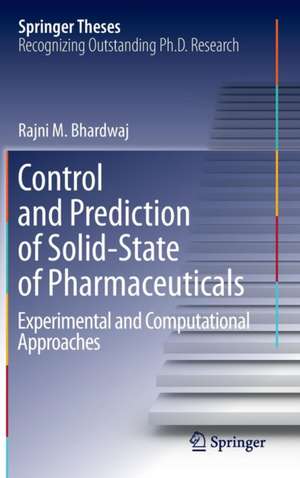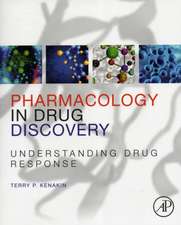Control and Prediction of Solid-State of Pharmaceuticals: Experimental and Computational Approaches: Springer Theses
Autor Rajni Miglani Bhardwajen Limba Engleză Hardback – 10 feb 2016
| Toate formatele și edițiile | Preț | Express |
|---|---|---|
| Paperback (1) | 639.59 lei 6-8 săpt. | |
| Springer International Publishing – 30 mar 2018 | 639.59 lei 6-8 săpt. | |
| Hardback (1) | 645.79 lei 6-8 săpt. | |
| Springer International Publishing – 10 feb 2016 | 645.79 lei 6-8 săpt. |
Din seria Springer Theses
- 18%
 Preț: 997.88 lei
Preț: 997.88 lei -
 Preț: 389.88 lei
Preț: 389.88 lei - 15%
 Preț: 646.94 lei
Preț: 646.94 lei - 18%
 Preț: 943.43 lei
Preț: 943.43 lei -
 Preț: 399.29 lei
Preț: 399.29 lei - 18%
 Preț: 944.99 lei
Preț: 944.99 lei - 15%
 Preț: 636.80 lei
Preț: 636.80 lei - 18%
 Preț: 941.05 lei
Preț: 941.05 lei - 15%
 Preț: 643.16 lei
Preț: 643.16 lei - 15%
 Preț: 642.68 lei
Preț: 642.68 lei - 18%
 Preț: 1103.62 lei
Preț: 1103.62 lei - 20%
 Preț: 558.83 lei
Preț: 558.83 lei - 18%
 Preț: 1112.30 lei
Preț: 1112.30 lei - 18%
 Preț: 944.19 lei
Preț: 944.19 lei - 18%
 Preț: 1109.92 lei
Preț: 1109.92 lei - 18%
 Preț: 1217.27 lei
Preț: 1217.27 lei - 15%
 Preț: 640.06 lei
Preț: 640.06 lei - 15%
 Preț: 636.45 lei
Preț: 636.45 lei - 15%
 Preț: 640.06 lei
Preț: 640.06 lei - 15%
 Preț: 640.88 lei
Preț: 640.88 lei -
 Preț: 389.70 lei
Preț: 389.70 lei - 20%
 Preț: 563.91 lei
Preț: 563.91 lei -
 Preț: 393.35 lei
Preț: 393.35 lei - 15%
 Preț: 637.93 lei
Preț: 637.93 lei - 15%
 Preț: 641.85 lei
Preț: 641.85 lei - 18%
 Preț: 1225.94 lei
Preț: 1225.94 lei - 20%
 Preț: 551.36 lei
Preț: 551.36 lei - 18%
 Preț: 1229.10 lei
Preț: 1229.10 lei - 15%
 Preț: 639.25 lei
Preț: 639.25 lei - 18%
 Preț: 999.45 lei
Preț: 999.45 lei - 15%
 Preț: 640.06 lei
Preț: 640.06 lei - 18%
 Preț: 1220.45 lei
Preț: 1220.45 lei - 18%
 Preț: 1116.26 lei
Preț: 1116.26 lei - 18%
 Preț: 1110.72 lei
Preț: 1110.72 lei - 18%
 Preț: 1000.87 lei
Preț: 1000.87 lei - 18%
 Preț: 891.17 lei
Preț: 891.17 lei - 15%
 Preț: 640.06 lei
Preț: 640.06 lei - 5%
 Preț: 1154.07 lei
Preț: 1154.07 lei - 15%
 Preț: 635.96 lei
Preț: 635.96 lei - 15%
 Preț: 640.88 lei
Preț: 640.88 lei -
 Preț: 387.20 lei
Preț: 387.20 lei - 18%
 Preț: 1109.92 lei
Preț: 1109.92 lei -
 Preț: 385.25 lei
Preț: 385.25 lei -
 Preț: 385.25 lei
Preț: 385.25 lei - 18%
 Preț: 1112.30 lei
Preț: 1112.30 lei - 18%
 Preț: 999.45 lei
Preț: 999.45 lei -
 Preț: 386.99 lei
Preț: 386.99 lei - 15%
 Preț: 637.13 lei
Preț: 637.13 lei - 20%
 Preț: 554.21 lei
Preț: 554.21 lei - 20%
 Preț: 555.59 lei
Preț: 555.59 lei
Preț: 645.79 lei
Preț vechi: 759.76 lei
-15% Nou
Puncte Express: 969
Preț estimativ în valută:
123.59€ • 128.55$ • 102.03£
123.59€ • 128.55$ • 102.03£
Carte tipărită la comandă
Livrare economică 14-28 aprilie
Preluare comenzi: 021 569.72.76
Specificații
ISBN-13: 9783319275543
ISBN-10: 3319275542
Pagini: 238
Ilustrații: XXXVII, 238 p. 121 illus., 77 illus. in color.
Dimensiuni: 155 x 235 x 18 mm
Greutate: 0.57 kg
Ediția:1st ed. 2016
Editura: Springer International Publishing
Colecția Springer
Seria Springer Theses
Locul publicării:Cham, Switzerland
ISBN-10: 3319275542
Pagini: 238
Ilustrații: XXXVII, 238 p. 121 illus., 77 illus. in color.
Dimensiuni: 155 x 235 x 18 mm
Greutate: 0.57 kg
Ediția:1st ed. 2016
Editura: Springer International Publishing
Colecția Springer
Seria Springer Theses
Locul publicării:Cham, Switzerland
Public țintă
ResearchCuprins
Introduction.- Aims and Objectives.- Materials and Methods.- Development and Validation of High_Throughput Crystallization and Analysis (HTCAA) Methodology for Physical Form Screening.- Predicting Crystallizability of Organic Molecules using Statistical Modelling Techniques.- Exploring Crystal Structure Landscape of Olanzapine.- Exploring the Physical Form Landscape of Clozapine, Amoxapine and Loxapine.- Conclusions and Further Work.
Textul de pe ultima copertă
This thesis investigates a range of experimental and computational approaches to the discovery of solid forms. It illustrates an inexpensive, practical and accurate way to predict the crystallizability of organic compounds based on molecular structure alone, while also highlighting the molecular factors that inhibit or promote crystallization. Furthermore, readers will gain a better understanding of the key factors underpinning solid-state structure and diversity. A major part of the thesis highlights experimental work carried out on two structurally very similar compounds, while another main section examines the influence of small changes in structure and substituents on solid-state structure and diversity using computational tools including crystal structure prediction, PIXEL calculations, Xpac, Mercury and statistical modelling tools. In closing, the author presents a fast validated method for solid-state form screening using Raman microscopy on multi-well plates to explore the experimental crystallization space.
Caracteristici
Nominated as an outstanding PhD thesis by the University of Strathclyde Demonstrates the value of combined experimental and computational approaches for a better understanding of the key factors underpinning solid-state structures and diversity in four pharmaceutical compounds Details an effective methodology for high-throughput crystallization and analysis for solid-state form screening using 48/96 multi-well plates and Raman spectroscopy Reports for the first time on the prediction of crystallizability using the random forest statistical modelling technique Includes supplementary material: sn.pub/extras









